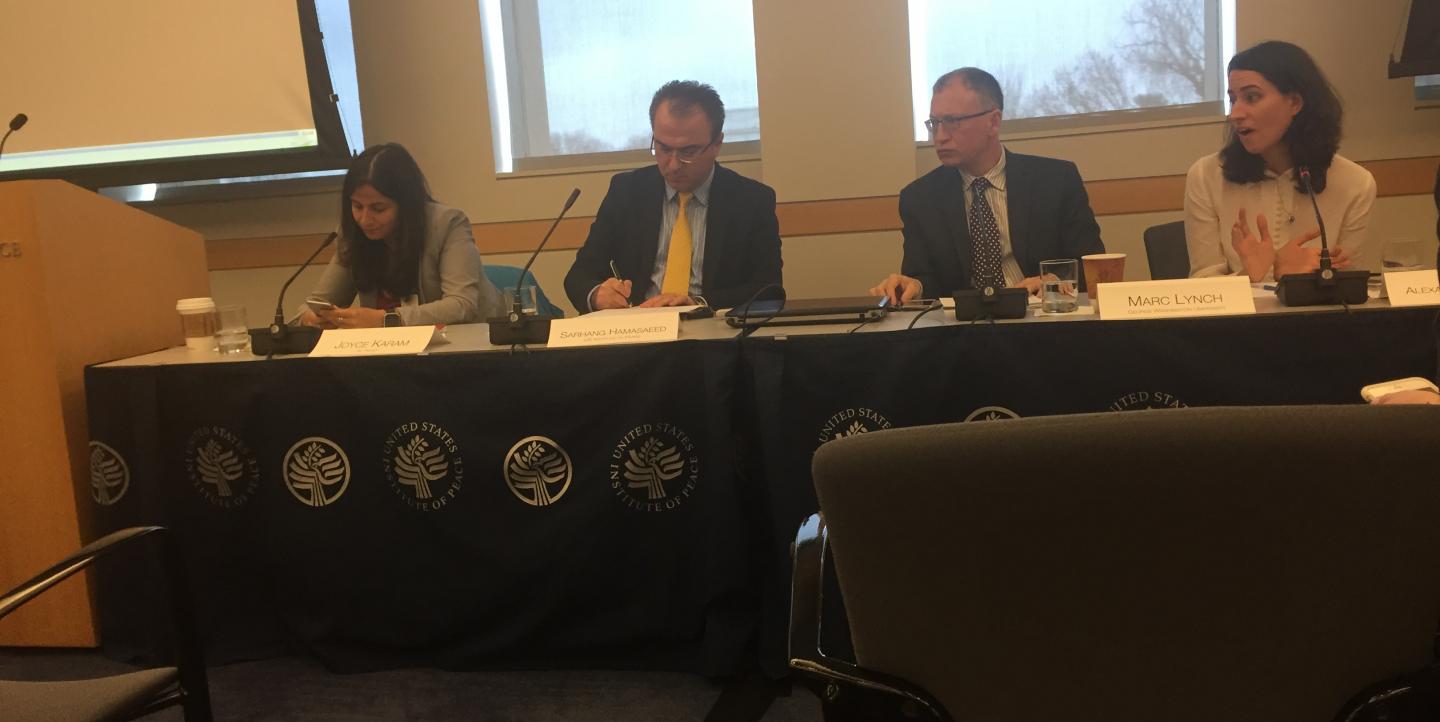The plurality of voices in Arab media may be the cause of deeply entrenched polarization in the region, according to a panel of experts hosted by the United States Institute of Peace (USIP).
Whether you believe the Arab Spring is a failed experiment or a necessary democratic transition for a region long plagued by authoritarianism, it’s hard to dismiss the media’s influence. Since a wave of protests swept through parts of the Middle East and North Africa in 2011, the media – both old and new – have been credited with uniting people and enlivening a previously stultified public sphere, contributing to the toppling of governments.
Today, the relationship between media and politics in the Arab world is much more complicated. The emergence of new and contesting groups has led to a proliferation of outlets. In light of this, can we say that the media has successfully reflected the freedom that people fought for? Can it contribute to political stability and social cohesion? In short – is it uniting or dividing people in the region?
A panel of experts aimed to answer this question: Alexandra Buccianti, project manager at BBC Media Action; Marc Lynch, professor of political science and international relations at George Washington University; and Joyce Karam, Washington bureau chief of Al Hayat.
Here are some key takeaways from the discussion:
New Game, Same Players
Social media was lauded for its democratic potential during the Arab Spring. Armed with their mobile phones, ordinary citizens across the region took to Twitter and Facebook to provide real-time, unfiltered coverage of events from the ground. This led to a plurality and diversity of voices that was once unthinkable in the Arab world.
However, governments have developed just as much social media savvy.
According to Buccianti, an important point to consider is “the rapid adaptability of Arab regimes on social media – either by cracking down on the online space or flooding it with their supporters.”
The same can be said about traditional media, Karam added. Despite the proliferation of news outlets in the region, the underlying narrative remains unchanged. News organizations continue to reflect their owners’ political interests. So much so that it has become increasingly difficult to make sense of any of the ongoing conflicts. “You see that prior to the Yemen war and during, not much is being asked,” she said. “The problem is one of ownership, censorship and polarization.”
From Media Plurality to Echo Chambers
Rather than promote social and political cohesion, media in the Arab world is being used to push people deeper into their disparate ideological silos.
“If you scroll down to the comments section on any newspaper,” Buccianti said, “you quickly realize that we are exposed to selective ideas, and we tend to go to the ideas we agree with.”
Though not unique to the region, Lynch noted that this echo chamber effect is much more pronounced in the Arab world. The result is an increasingly polarized environment, where “everyone gets down to their own trenches and [doesn’t] react with each other.”
Karam supported this point by demonstrating how the fractured political climate in the region is being reinforced by the media’s coverage: “If you look at the Syrian civil war’s coverage on Al Jazeera, you hear them call the insurgency ‘rebels.’ When you turn to Al Mayadeen (supported by Iran) or Al Manar (Hezbollah’s media arm), you hear them call the rebels ‘terrorists.’ The same problems are being repeated and you don’t know what to believe.”
What is more troubling, according to Lynch, is the inability for audiences outside the Arab world to separate partial and impartial news.
“You have rich, dense, contested, national online media spaces,” he explained. “But there are only a small number of bridges and translators from those communities into the West and the U.S. So when people think they’re getting unmediated access, they are getting embedded with people who are translating their cluster’s point view. It is a valuable view, but necessarily partial.”
There’s More to Arab Media Than Politics
To better understand the role of media in the Arab world, the panelists emphasized the importance of non-political programming. “Don’t get too hung up on politics,” Lynch noted in his concluding remarks. Talk shows, debate programs, sports, drama and entertainment are also very popular with Arab audiences and have the potential promote social cohesion.
Comedy programs, Buccianti added, also trigger useful discussion. She referenced the Egyptian satirist Bassem Youssef, who rose to fame in the aftermath of the January 23 revolution.
This type of programming is often overlooked in studies of Arab media, according to Buccianti and Lynch, but it is “exactly this cluster that overtime became the foundation of important social movements.”
Fatima Bahja is research and proposals coordinator at the International Center for Journalists.
Main image taken by Fatima Bahja.


